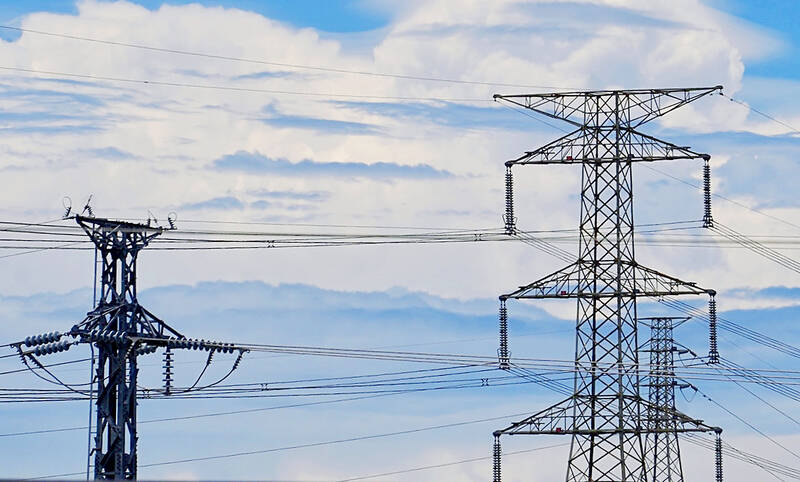The Ministry of Economic Affairs on Wednesday unveiled a draft energy conservation plan to reduce electricity use in Taiwan by 35.13 billion kilowatt-hours (kWh) by 2030.
The plan drawn up by the Bureau of Energy comprises a slew of energy-saving strategies and measures covering industry, commerce, housing, transportation, and technology research and development.
Industry users are expected to be responsible for nearly 50 percent of the energy savings, while commercial and residential electricity savings would account for the rest, the bureau said.

Photo: CNA
Industrial energy conservation would focus on improving the efficiency of electric motors that consume the most power, as well as promoting energy-efficient industrial air-conditioning and air compressor systems, the bureau said.
For residential users, the plan would raise the minimum energy performance standards for refrigerators and air-conditioners to level 3, the most stringent in the world, it added.
The government would provide incentives to encourage the use of energy-efficient products and equipment, and evaluate offering tax credits for purchases of energy-saving home appliances, according to the plan.
The plan would also require low-voltage power users, such as retail stores, restaurants and households, to install smart electricity meters, aiming for 6 million units by 2030, the bureau said.
Commercial energy-saving measures include replacing old fluorescent lighting with energy-efficient LED lighting, promoting the use of energy-saving appliances, including air-conditioners and refrigeration equipment, and improving the efficiency of commercial air-conditioning systems, it said.
The plan is part of the government’s goal to reach net zero emissions by 2050, as announced by the National Development Council.

Three experts in the high technology industry have said that US President Donald Trump’s pledge to impose higher tariffs on Taiwanese semiconductors is part of an effort to force Taiwan Semiconductor Manufacturing Co (TSMC, 台積電) to the negotiating table. In a speech to Republicans on Jan. 27, Trump said he intends to impose tariffs on Taiwan to bring chip production to the US. “The incentive is going to be they’re not going to want to pay a 25, 50 or even a 100 percent tax,” he said. Darson Chiu (邱達生), an economics professor at Taichung-based Tunghai University and director-general of

‘LEGACY CHIPS’: Chinese companies have dramatically increased mature chip production capacity, but the West’s drive for secure supply chains offers a lifeline for Taiwan When Powerchip Technology Corp (力晶科技) entered a deal with the eastern Chinese city of Hefei in 2015 to set up a new chip foundry, it hoped the move would help provide better access to the promising Chinese market. However, nine years later, that Chinese foundry, Nexchip Semiconductor Corp (合晶集成), has become one of its biggest rivals in the legacy chip space, leveraging steep discounts after Beijing’s localization call forced Powerchip to give up the once-lucrative business making integrated circuits for Chinese flat panels. Nexchip is among Chinese foundries quickly winning market share in the crucial US$56.3 billion industry of so-called legacy

Taiwan Semiconductor Manufacturing Co (TSMC, 台積電) yesterday held its first board of directors meeting in the US, at which it did not unveil any new US investments despite mounting tariff threats from US President Donald Trump. Trump has threatened to impose 100 percent tariffs on Taiwan-made chips, prompting market speculation that TSMC might consider boosting its chip capacity in the US or ramping up production of advanced chips such as those using a 2-nanometer technology process at its Arizona fabs ahead of schedule. Speculation also swirled that the chipmaker might consider building its own advanced packaging capacity in the US as part

A move by US President Donald Trump to slap a 25 percent tariff on all steel imports is expected to place Taiwan-made steel, which already has a 25 percent tariff, on an equal footing, the Taiwan Steel & Iron Industries Association said yesterday. Speaking with CNA, association chairman Hwang Chien-chih (黃建智) said such an equal footing is expected to boost Taiwan’s competitive edge against other countries in the US market, describing the tariffs as "positive" for Taiwanese steel exporters. On Monday, Trump signed two executive orders imposing the new metal tariffs on imported steel and aluminum with no exceptions and exemptions, effective